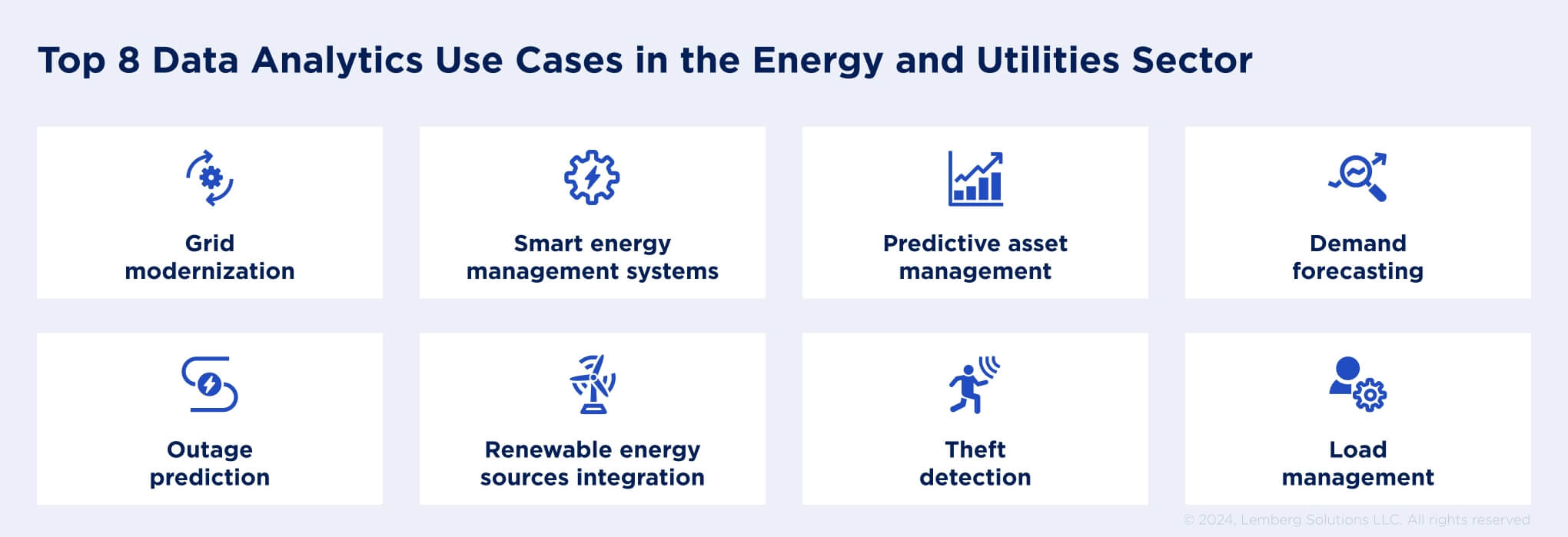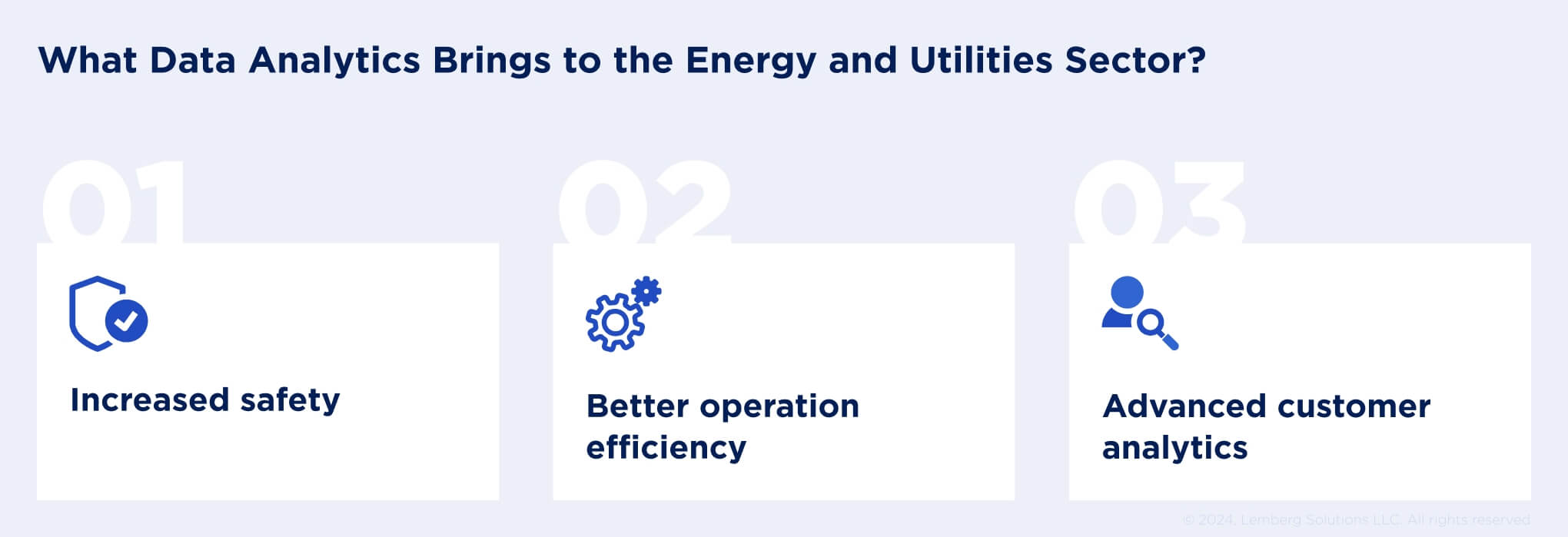Data analytics in the energy and utilities sector appears as a cornerstone that lays the foundation for an energy-efficient future. As demand for sustainable and reliable energy supplies grows, energy companies are turning to advanced analytics to optimize energy management and improve asset performance.
Based on our experience, we have identified eight key examples of data analytics that are enhancing operational efficiency and customer service in the energy and utilities sector. Read on to learn more!
8 data analytics use cases in the energy and utilities sector
The energy and utilities sector generates an enormous amount of data throughout every phase of the energy value chain. This data encompasses sensor records, pricing details, and customer information from energy trading platforms. Yet, only a minor part of this information is actually analyzed—the rest remains unstructured. Data analytics in energy sector provides numerous ways to identify innovative approaches for energy production and distribution, and here are some of them:

Grid modernization
The grid is one of the energy system’s keystones as it ensures constant delivery of electricity from power stations to homes. With advanced data analysis tools, such as Power BI, Tableau, ML-algorithms or custom solutions, energy and utility companies can closely monitor the grid's performance, detecting anomalies and weak spots.
Data-driven insights empower utility providers to optimize their energy management strategy and grid infrastructure. This leads to a consistent energy supply, eliminates potential capacity constraints, and minimizes the likelihood of network outages.

Smart energy management systems
The advent of smart energy management systems has significantly changed the energy industry. They introduce sustainable and efficient ways to control and intelligently distribute energy in home and industrial settings. Such systems collect data from embedded IoT sensors and use data analytics algorithms to suggest specific energy-saving actions to mitigate excessive power usage and reduce energy overload.
Predictive asset management
Data analytics in energy is transforming asset maintenance, shifting from reactive approach, when a failure has already occurred, to proactive solutions. With information about the condition and performance of assets collected through sensors and maintenance records, energy companies can identify potential risks and take appropriate timely action. Predictive asset management reduces the likelihood of operational downtime and high emergency repair costs, increasing the reliability of energy systems.
Demand forecasting
Private utilities companies and government agencies can rely on demand forecasting to ensure effective resource allocation to meet the future energy demand. Advanced data forecasting models make this process easier by revealing consumption patterns and shifts in consumer behavior. By analyzing historical data and weather reports, energy data science can identify peak demand periods so that utility companies can fine-tune their energy distribution strategies.
Outage prediction
Unexpected power outages resulting from severe weather conditions or natural disasters greatly distress consumers, significantly disrupting their daily routines. Using predictive machine learning models helps utility companies enhance their outage management process. By assessing both meteorological and non-meteorological factors, these models determine what issue can affect the stability and efficiency of the power grid.
Statistical models are among the most effective methods for making accurate assumptions about the likelihood of an outage. They provide energy suppliers with an early warning of a potential problem for proactive actions, reducing the impact on business operations and people's lives.
Renewable energy sources integration
Renewable energy sources provide a variety of advantages fostering a more sustainable future, cutting down carbon emissions. However, integrating them into the existing network can be quite a challenge. Data analytics for utilities supports this process by estimating the energy production from renewable sources. Thereby, grid operators can adjust the grid hosting capacity according to the insights.
Also, by analyzing weather patterns and spatial data, energy companies can discover the best placement for their solar panels and wind turbines to optimize their potential to the fullest and maximize the energy yield.
Theft detection
The global economy loses around $89.3 billion every year due to electricity theft, which negatively impacts the grid stability and power supply. Data-driven theft detection is one of the most effective ways to detect breaches or fraud activity. Energy data science solutions track consumer energy consumption patterns and identify suspicious behavior, which may signal fraud. With real-time data analysis, companies can swiftly act on alerts about detected tampering and stop fraudulent activity by disconnecting service before the issue becomes critical.
Load management
Load management is the backbone of efficient and stable electric grid operations. It controls energy consumption, optimizing the available power supply to meet customers' demands. Without effective load management, the power grid’s stability grid is at risk of overloading, which can lead to power outages or massive blackouts.
Energy data analytics helps to identify inefficiencies in power distribution routes and take timely action to reduce the risk of grid congestion. Utilizing all available energy data, advanced algorithms provide an overview of peak demand periods, consumption patterns, and power fluctuations. Based on such insights, energy companies can create better strategies for power load management, enhancing grid stability and minimizing wastage.
What data analytics brings to the energy and utilities sector?

Data analytics in energy is redefining the sector, fostering smarter strategic choices and operational enhancements to navigate the rapidly evolving industry landscape. Energy data science methods such as predictive modeling, analysis, and machine learning can assist energy and utility companies in extracting valuable insights to predict demand and improve the energy supply, assess resource availability, and integrate renewable energy solutions for a more sustainable future.
Take a look at several crucial benefits of data analytics for the energy and utilities sector:
- Increased safety
Armored with the power of data, energy and utilities companies can swiftly detect safety issues, such as equipment problems or hacking attempts, and take immediate actions to mitigate these risks.
- Better operation efficiency
Data analytics in energy sector allows for rapid identification of areas in the energy system that demand improvement. With data-driven insights, energy providers can adjust inefficiencies and enhance system stability while minimizing the costs associated with outdated management processes.
- Advanced customer analytics
With smart analytic algorithms, energy suppliers can get information about consumer behavior to create personalized recommendations or payment plans for each user, thus increasing customer satisfaction.
How Lemberg Solutions can help you to integrate data analytics into your energy solution?
With more than 15 years of proven experience, Lemberg Solutions is recognized as a trusted data science provider with deep energy and utility sector expertise. Our team consists of professionals who hold Ph.D.s in data science and are adept in managing the entire development process of your data solution. From gathering and analyzing data from various sources to building and integrating top-notch models, we cover all your needs and provide highly accurate outcomes.
Our data science team can help optimize your grid management, monitor the condition of your equipment, and forecast customer demand more efficiently. We harness machine learning techniques for enhanced risk management, swiftly identifying fraud activity or the likelihood of breakage.
Acknowledged by ISO 9001:2015 and ISO 27001:2013 certifications for our service quality and security, our experts adhere to the top energy sector regulations and standards to guarantee your data is well-secured.

Final thoughts
As the energy and utilities industry continues to evolve, incorporating data analytics is the pivotal step to deliver high-quality energy services and meet consumer demand. However, given the immense volume of data generated in the sector, obtaining valuable information is a challenging task requiring profound skills and experience. Partnering with a reliable vendor can unlock the full spectrum of data analytics benefits to refine your energy systems, resulting in improved efficiency, enhanced safety, and greater sustainability.
Contact us today to transform your energy solution with our data science professionals!




